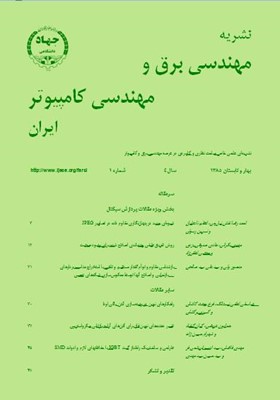راهکارهاي نوين در بهينهسازي آنتن ياگي اودا
محورهای موضوعی : electrical and computer engineeringعباسعلی لطفی نیستانک 1 * , فرخ حجت کاشانی 2
1 - پژوهشکده برق جهاد دانشگاهي
2 - دانشگاه علم و صنعت ايران
چکیده مقاله :
در اين مقاله روشهاي مختلف بهينهسازي از قبيل الگوريتم ژنتيك و الگوريتم ژنتيك با الهام از روش فرایند تدریجی سرد شدن فلزات و الگوريتم ژنتيک مبتني بر تصميم گيري فازي و همچنين روش گروه ذرات (PSO) در بهينهسازي يک آنتن ياگي 5 عنصره مورد استفاده قرار گرفته است. براي تحليل از نرمافزار Super NEC به دليل سرعت اجرايي بالاي آن استفاده شده است. از آنجايي که بهينهسازي آنتنها در يک باند فرکانسي از طريق الگوريتم ژنتيک و الگوريتم ژنتيك با الهام از روش فرایند تدریجی سرد شدن فلزات زمان خيلي زيادي براي اجرا میطلبد و از طرفي ممکن است با کم کردن اعضاي جمعيت و تعداد تکرار دقت بهينهسازي کم شود سيستم بهينهسازي ژنتيکي مبتني بر تصميم گيري فازي نيز معرفي شده است. همچنين روش گروه ذرات نيز به عنوان يک روش کارا و با همگرايي خوب در اين بهينهسازي معرفي شده است. مقايسه ميان تكنيكهاي بهينهسازي نشان میدهد که الگوريتم ژنتيك مبتني بر تصميم گيري فازي و همچنين روش گروه ذرات در رابطه با نتايج حاصله مؤثرتر و بهتر عمل نموده و همچنين از نظر اجرا نيز به زمان كمتري نياز دارد.
In this paper, several methods for optimization of a 5-elements Yagi antenna are proposed using genetic algorithm, genetic algorithm inspired by simulated annealing, genetic algorithm based on fuzzy decision making, and particle swarm method. High speed run time of SuperNEC software, it has been used for analyzing the presented methods. The use of genetic algorithm or genetic algorithm inspired by simulated annealing for antenna optimization in a specific frequency band, needs long run time. Besides, reduction of the number of population and the amount of repetition, causes decrease in optimization precision. So, an optimization system base on fuzzy decision making is proposed. In addition, the particle swarm method which has a good convergence rate and good performance has been proposed to obtain a better optimization. The comparison between the proposed optimization methods shows that the genetic based on fuzzy decision making and the particle swarm methods have the best performance and functionality and the least run time.
[1] Y. Rahmat-Samii and E. Michielssen, Electromagnetic optimization by genetic algorithms, New York: John Wiley & Sons, 1999.
[2] E. A. Jones and W. T. Joines, "Design of Yagi-Uda antennas using genetic algorithm," IEEE Trans. Antennas Prop., vol. 45, no. 9, pp. 1386-1392, Sep. 1997.
[3] D. Correia, A. J. M. Soares, and M. A. B. Terada, "Optimization of gain impedance and bandwidth in Yagi-uda antemnas using genetie algorithm," in Proc SBMO/IEEE MlT-S IMOC’99 int., vol. 1, pp. 41- 44, Aug. 1999.
[4] B. A. Austin and Wen-Chung Liu, "An optimized shaped yagi-uda array using the genetic algorithm," in Proc. IEE National Conf. on Antennas and Propagation, pp. 245-248, no. 461, Mar.-Apr. 1999.
[5] H. J. Wang, K. F. Man, C. H. Chan, and K. M. Luk, "Optimization of Yagi array by hierarchical genetic algorithms",in Proc Radio & Wireless Conf. RAWCON’03, pp.91-94, Aug. 2003.
[6] Y. Kuwaha, "Multiobjective optimization design of Yagi–Uda Antenna," IEEE Trans. Antennas Prop., vol. 53, no. 6, pp. 1984-1992, Jun. 2005.
[7] D. Gies and Y. Rahmat-Samii, "Particle swarm optimization for reconfigurable phase differentiated array design," Microwave and Optiucal Technology Letters, vol. 38, no. 3, pp. 168-175, Aug. 2003.
[8] M. Clerc and J. Kennedy, "The particle swarm: explosion, stability, and convergence in a multidimensional complex space," IEEE Trans Evolutionary Computation, vol. 6, no. 1, pp. 58-73, Feb. 2002.
[9] J. Robinson and Y. Rahmat-Samii, "Particle swarm optimization in electromagnetics," IEEE Trans. Antennas Prop. vol. 52, no. 2, pp. 397-407, Feb. 2004.
[10] J. L. Lawson and Yagi Antenna Design, American Radio league, US: New York, 1986.
[11] E. A. Jones, Genetic Design of Antennas and Electronic Circuits, Ph.D. Thesis, Department of Electrical and Computer Engineering, Duke University, 1999.
[12] مهدي شيرازي، "بهينهسازي و ساخت آنتن ياگي با استفاده از الگوريتم ژنتيک،" پاياننامه کارشناسي ارشد مخابرات، دانشگاه علم و صنعت ايران، 1379.
[13] L. Davis and D. E. Goldberg, Genetic Algorithms and Simulated Annealing, Pitman Publishing, London, 1990.
[14] A. A. Lotfi Neyestanak, F. Hojjat Kashani, and K. Barkeshli, "E-shaped patch antenna design based on genetic algorithm using decision fuzzy rules", Iranian Journal of Electrical and Computer Engineering, vol. 4, no. 1, pp. 18-24, Winter-Spring 2005.
[15] Fuzzy Toolbox of MATLAB 7, 2004, http://www.mathworks.com/.

